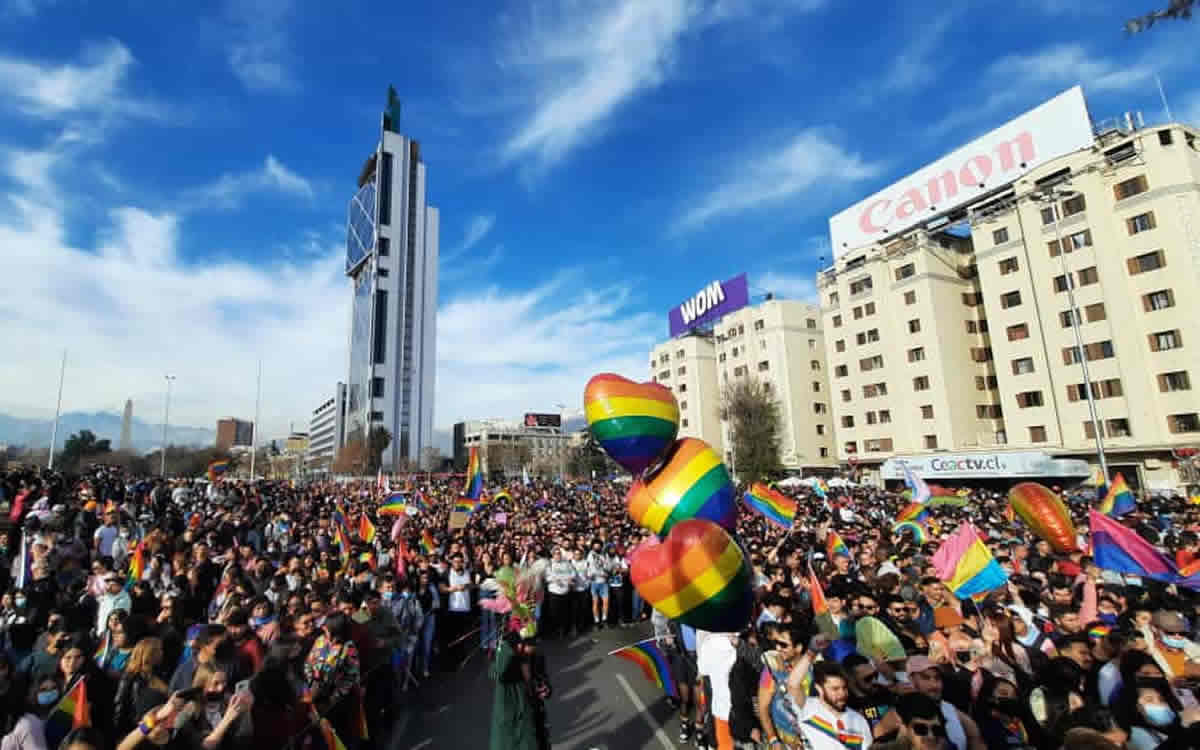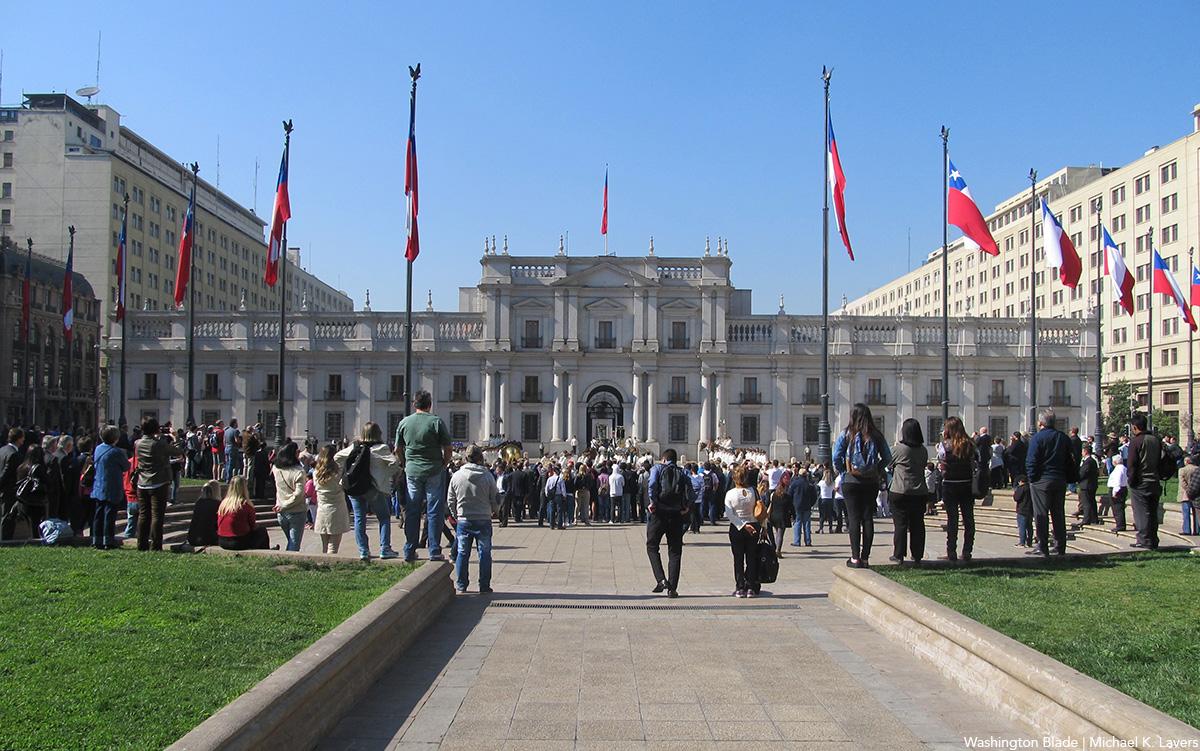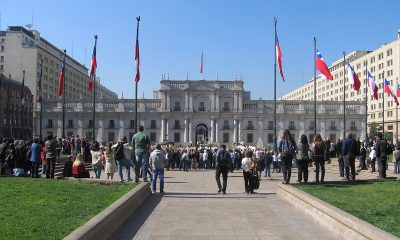South America
Chileans overwhelmingly reject new constitution
Document would have enshrined LGBTQ rights in country

Chileans on Sunday overwhelmingly rejected a new constitution that would have enshrined LGBTQ rights in an unprecedented way.
Upwards of 80 percent of Chileans in October 2020 voted in favor of changing the constitution.
More than 60 percent of them rejected the new constitution in Sunday’s referendum. Slightly more than 38 percent of Chileans voted to approve it.
The need to change the current constitution, which is a legacy of Gen. Augusto Pinochet’s dictatorship, arose after social unrest in 2019 that exposed long-standing standing inequalities in the South American country.
The new constitution, which a Constitutional Convention with an equal number of men and women and eight openly LGBTQ members, was drafted in one year. Gaspar Domínguez, a gay doctor, was the Constitutional Convention’s vice president.
There were several points of disagreement.
One of the constitution’s most controversial amendments called for Chile to become a plurinational state that would have recognized the existence of the different indigenous people in the country. The “rejection” groups argued the recognition of indigenous people would have created a privileged group and divided the country.
This discourse permeated the debate over the constitution.
President Gabriel Boric’s government said the referendum went well in terms of participation, public transportation and the functioning of the institutions that helped carry it out. The results were available a few minutes after the polling stations closed.
Boric addressed the country from La Moneda, Chile’s presidential palace, in a nationally broadcast speech after the results were known.
He valued the high participation and celebrated the “triumph of democracy.” At the same time, however, he said the “constituent process has not ended.”
Boric said his government will “agree as soon as possible on the terms of the new constitutional process,” alluding to the fact that the Pinochet-era constitution must be changed. Those who supported the “rejection” option have also committed themselves to find a new way to change the constitution.
Congresswoman Emilia Schneider, a Boric supporter who is the country’s the first openly transgender member of Congress, on Twitter acknowledged the “hard result” of the referendum.
“The constitution of the dictatorship does not unite us and we could not build a majority around the proposal for which we voted,” said Schneider. “The cycle of changes is not over. Citizens demand social rights and more democracy. It is urgent to give answers.”
“The constituent process does not end here. It is time for those on the side of rejection to assert their commitment,” she stressed. “From tomorrow we must work for a new democratic process, with parity, with indigenous peoples and (a) participatory (process.) Chile has spoken and we need a new constitution.”
Most LGBTQ organizations and activists in Chile urged voters to “approve” the new constitution because it would have extended explicit rights to the community for the first time. These would have included the recognition of non-heteronormative families outside of marriage, the right to gender identity and expression, nondiscrimination and reproductive rights.
Alessia Injoque, director of Fundación Iguales, an organization that works with the Human Rights Campaign, told the Washington Blade “the new constitution, if approved, would have represented a very significant advance in the protection of our families, in freedom to live authentic lives and without discrimination.”
“It is regrettable that this advance will not be consolidated, but it is time to recognize the result and work so that these rights are part of the next process,” Injoque lamented.
Injoque in response to a question about the possibility of a new constituent process to draft a new constitution said “in politics the doors are never completely closed.”
“It is difficult to think that we will have such a clear opportunity, with such a strong constitutional proposal on LGBTIQ+ rights, but we will continue working until we achieve full equality and the same freedoms,” said Injoque.
Javiera Zuñiga, the spokesperson for the Movement for Homosexual Integration and Liberation, another LGBTQ rights group in Chile, told the Blade the draft constitution had “unprecedented positive elements” and there was “an excessive confidence that all citizens felt highly represented by the text.”
“Certainly in what follows in the constitutional process, it will be fundamental to achieve greater consensus on the matters that did not convince Chileans on this occasion,” said Zuñiga.
“The matters related to substantive equality that were included in the proposal are not part of the conflictive elements in the proposal, such as nondiscrimination, respect for identity and equality of rights are quite well installed among Chileans as basic principles of the society we wish to build,” added Zuñiga. “I believe that this has been one of the greatest gains of the process.”
Zuñiga said Movilh “will continue to contribute to (the constituent process and) nurture it and achieve for the community nothing less than what this proposal considered.”
Argentina
LGBTQ seniors in Argentina face uncertain future
President Javier Milei’s policies have disproportionately impacted retired pensioners

Editor’s note: International News Editor Michael K. Lavers will be on assignment in Argentina and Uruguay through April 12.
Argentina has undergone significant changes in its economic and social policies since President Javier Milei’s inauguration in December 2023. These changes have had a significant impact on various sectors of society, especially retirees and the LGBTQ community.
Mercedes Caracciolo, a 79-year-old sociologist and lesbian activist, shared her experience with the Washington Blade on how the new measures have affected her quality of life.
“Since Milei’s arrival in government, which began with a brutal devaluation, I am more careful in my spending than I was before,” she said.
Although Caracciolo has additional income from rental properties, she recognizes the situation is much more critical for those who exclusively depend on a pension.
With more than 7 million people receiving pensions, many find themselves “scratching the poverty line” due to the loss of purchasing power. The libertarian government’s economic policies have drastically affected their welfare, leading to a wave of protests across the country.
The reduction of social programs and the lack of LGBTQ-specific public policies have deepened the difficulties that seniors already face. The loss of economic stability particularly affects those who have historically lived on the margins, with fewer job opportunities and limited access to a decent retirement. Many older LGBTQ people, who have spent their lives unable to form traditional families, now find themselves without a support network and with an increasingly less present State.
The advance of conservative discourses has also generated a climate of insecurity and fear.
“There is no more sense of security and stability in old age,” Graciela Balestra, a psychologist who is the president of Puerta Abierta a la Diversidad, the first home for LGBTQ seniors in Argentina, explained. “Many LGBTQ+ retirees fear that there are fewer and fewer rights. They see what is happening in Argentina and globally with the advance of the right wing, and they feel that what they worked so hard to achieve is in jeopardy.”
In addition to economic difficulties, the LGBTQ community has faced additional challenges.
Caracciolo noted many supportive spaces have had their government subsidies reduced or eliminated, weakening community networks essential to the well-being of LGBTQ seniors.
“Community networks are also weakened because many of them require state support for certain types of expenses,” she noted.
Balestra warned about the psychological impact.
“Obviously it impacted mental health. There is much more anxiety, there is fear. People who say ‘I’m afraid they’ll kill me’ or ‘I’m afraid to show myself,'” she said. “Before, they used to walk down the street holding hands with their partner, and now they don’t do it anymore. A lot of hopelessness.”
For Balestra, the concern goes beyond the LGBTQ community.
“The economic issue, the rights issue, the fear that something similar to the dictatorship will return. All of this is very scary. And besides, the hopelessness of believing that this is going to continue, that it is not going to change even in the next elections,” she said.
Civil society organizations have denounced an “adjustment” in policies related to gender and diversity that Milei’s government has undertaken. Pride marches in Argentina have become a stage for protests against the president’s policies, especially over his speeches that activists consider hateful towards the LGBTQ community.
Balestra stresses the fear is not only individual, but collective.
“Human rights no longer exist anywhere, women no longer have the place they used to have, they are once again objectified, machismo is on the rise again,” she said. “This brings a lot of despair to older people.”
Despite the climate of uncertainty, Balestra emphasizes resistence forces are still in force.
“We continue working, as always,” she said. “For 25 years at Puerta Abierta we have been doing reflection groups, cultural workshops, social meetings, all with respect to being able to make LGBT people aware of their rights. We never stop meeting, but lately we are talking more and more about these things that we had already left a little behind. The issue of coming out, fear, visibility. Now we have to talk about it again.”
Chile
2024 was ‘year of regression’ for LGBTQ rights in Chile
Advocacy group blamed rise in ultra-right, government inaction

A report that a Chilean advocacy group released on Tuesday says 2024 was a “year of regression” for LGBTQ rights.
The Movement for Homosexual Integration and Liberation (Movilh)’s 23rd Sexual and Gender Diversity Human Rights report notes LGBTQ rights for the first time since democracy returned to Chile in 1990 not only stopped advancing, but saw significant rollbacks in the three branches of government.
The Movilh report describes 2024 as “the year of regression,” noting 23.5 percent of human rights violations against LGBTQ people over the last two decades occurred last year. A total of 2,847 discrimination complaints were reported in 2024, representing a 78.7 percent increase over the previous year.
The report documents two murders, 44 physical or verbal assaults, two incidents of violence in police stations, 89 reports of abuse in the workplace, and 65 incidents in educational institutions in 2024. The transgender community was particularly affected, with a 462.6 percent increase in discrimination cases compared to 2023.
The Movilh report notes the growing influence of the ultra-right, whose narratives have fostered hate speech, is one of the main factors behind the deterioration of LGBTQ rights in Chile. The advocacy group also criticizes authorities who have remained silent in the face of these attacks, even though they say they support the LGBTQ community.
The report specifically singles out the Executive Branch.
Movilh specifically highlights the prohibition of public funds for hormone treatments for trans minors and the postponement of these procedures in public hospitals. The government reversed course after intense pressure and judicial appeals.
The report also criticizes the judiciary.
The Oral Criminal Trial Court of San Antonio refused to classify the murder of a trans woman as a femicide, arguing her identity card still reflected the gender assigned to her at birth. The Court of Appeals of Santiago also ordered the removal of a homophobia complaint on social media, setting what NGOs have described as a dangerous freedom of speech precedent.

annual Pride parade on June 29, 2024. (Photo courtesy of the Movement for Homosexual Integration and Liberation)
The report notes Valparaíso, Metropolitana, and Biobío are the three regions with the highest number of discrimination complaints, with 51.3 percent, 25.1 percent, and 5.8 percent respectively. Reported cases increased in 11 of Chile’s 16 regions, with Ñuble leading the way with a 300 percent increase.
Faced with this bleak panorama, advocacy groups have intensified their efforts to denounce the violence and demand LGBTQ rights are once again guaranteed. Movilh, along with other organizations, have approached the Inter-American Commission on Human Rights and the U.N. about the situation in Chile.
“We are seeing a reversal of rights that cost decades of struggle,” warns the report. “If the State does not act urgently, we run the risk of discrimination and violence becoming institutionalized.”
Bolivia
Casa Trans Pamela Valenzuela is beacon of hope for LGBTQ Bolivians
Refuge, community center opened in La Paz in 2022

In a context where discrimination and exclusion continue to be a reality for Bolivia’s LGBTQ community, Casa Trans Pamela Valenzuela stands as a refuge and comprehensive support center for transgender people.
Casa Trans since it opened in 2022 has provided essential services that go beyond simple housing, offering legal, medical, psychological, and food assistance.
Located in the San Pedro neighborhood of La Paz, the national capital, Casa Trans opens each day, offering a soup kitchen where clients can prepare their own food. Anyone in need of a meal is welcome, although its main objective is to assist trans women and men.
Luna Humérez, president of the Organización de Travestis, Transgéneros y Transexuales Femeninas (Otraf) in Bolivia and director of Casa Trans, told the Washington Blade the project began to address needs the COVID-19 pandemic exacerbated. Many trans people found themselves homeless and without means to support themselves because of the loss of informal jobs or sex work.
Support from the Global Fund allowed Humérez and other activists to create a space that offers free food and shelter.
“What inspired the creation of the Casa Trans was post-COVID,” explained Humérez. “You know that in COVID there were many problems with the trans community, especially the Latino trans community, because they were doing sex work, they lived on a daily basis, they lived in rents, they could not go out to work. So, many suffered from housing and food issues. So, the creation of the Casa Trans was to mitigate a little and help the trans population with free food from Monday to Friday.”
The activist said the assistance that Casa Trans has been able to offer has expanded.
“The spaces have been expanded, a multidisciplinary care team has been expanded, from a social worker, a psychologist, an endocrinologist, a general practitioner, a legal advisor, a lawyer and the peer-to-peer work that we do,” said Humérez.
“The space has evolved too much and we are attending more and more cases and helping more and more people. And not only LGBT people, but also people in vulnerable situations,” she added.
LGBTQ people in Bolivia continue to face significant challenges in health, education, employment, and housing, despite some legal and social advances.
The First Virtual Survey of the country’s LGBTQ community, which the Ombudsman’s Office and the National Institute of Statistics conducted, found more than 60 percent of respondents said they have faced discrimination at some point in their lives. This mistreatment includes verbal and physical violence and exclusion in the workforce and the education system.
Thirty-three percent of respondents also said they do not have any type of health care; with sexual minorities and trans women the most vulnerable. Sixty-five percent of respondents said they do not know how to access Bolivia’s Unified Health System.
Humérez pointed out that “legislation in Bolivia and the rights of trans people have been improving over the years.”
“We have had a leftist government that, although it has done some things such as the Gender Identity Law and the Anti-discrimination Law, they have not been enough,” Humérez told the Blade. “At the moment the trans population in Bolivia does not have all the rights as the cisgender population. So, at this moment we are cut off from many things and we think it is important that we must keep fighting and fighting so that the state can recognize our full rights without any restrictions.”
Humérez said it is important for LGBTQ activists to participate in elections that will take place this year.
“I think it is important that we must be political actors in these new elections that are coming this year,” she said.

Casa Trans struggles to secure funding
Casa Trans not only offers a roof and food; but legal advice, specialized medical care in the transition process, psychological support, and job training opportunities. A multidisciplinary team — a lawyer, a social worker, a psychologist, and an endocrinologist — works to provide these services. Casa Trans also arranges scholarships for colleagues who wish to study at a university or technical institute.
“The challenges are complicated because we do not have direct funding,” said Humérez, who noted those who work with Casa Trans are volunteers.
She said U.S. President Donald Trump’s decision to freeze nearly all American foreign aid will make efforts to secure enough funding for Casa Trans even more difficult.
“Now with Donald Trump becoming president of the United States, I believe that many things will become more difficult, not only in the United States, but this will also affect the countries of the region, Latin America, among others,” said Humérez. “So, for us it is important that we have financial support so that our work can continue because the work we do is very important.”
The existence and work of the Pamela Valenzuela Trans House highlights the urgency of addressing the inequalities and discrimination faced by the LGBTQ community in Bolivia.
-

 Movies1 day ago
Movies1 day agoSexy small town secrets surface in twisty French ‘Misericordia’
-

 Federal Government2 days ago
Federal Government2 days agoMass HHS layoffs include HIV/AIDS prevention, policy teams
-

 Maryland3 days ago
Maryland3 days agoAt transgender visibility celebration, Moore called out for lack of action
-

 Arts & Entertainment3 days ago
Arts & Entertainment3 days ago‘Think of those who have not been seen,’ Cynthia Erivo’s powerful message at GLAAD Awards










